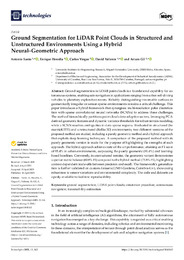Título :
Ground Segmentation for LiDAR Point Clouds in Structured and Unstructured Environments Using a Hybrid Neural–Geometric Approach |
Autor :
Santo López, Antonio 
Heredia-Aguado, Enrique 
Viegas, Carlos
Valiente, David
Gil, Arturo  |
Editor :
MDPI |
Departamento:
Departamentos de la UMH::Ingeniería de Sistemas y Automática |
Fecha de publicación:
2025-04-16 |
URI :
https://hdl.handle.net/11000/36836 |
Resumen :
Ground segmentation in LiDAR point clouds is a foundational capability for autonomous systems, enabling safe navigation in applications ranging from urban self-driving
vehicles to planetary exploration rovers. Reliably distinguishing traversable surfaces in
geometrically irregular or sensor-sparse environments remains a critical challenge. This
paper introduces a hybrid framework that synergizes multi-resolution polar discretization with sparse convolutional neural networks (SCNNs) to address these challenges.
The method hierarchically partitions point clouds into adaptive sectors, leveraging PCAderived geometric features and dynamic variance thresholds for robust terrain modeling,
while a SCNN resolves ambiguities in data-sparse regions. Evaluated in structured (SemanticKITTI) and unstructured (Rellis-3D) environments, two different versions of the
proposed method are studied, including a purely geometric method and a hybrid approach
that exploits deep learning techniques. A comparison of the proposed method with its
purely geometric version is made for the purpose of highlighting the strengths of each
approach. The hybrid approach achieves state-of-the-art performance, attaining an F1-score
of 95.4% in urban environments, surpassing the purely geometric (91.4%) and learningbased baselines. Conversely, in unstructured terrains, the geometric variant demonstrates
superior metric balance (80.8% F1) compared to the hybrid method (75.8% F1), highlighting
context-dependent trade-offs between precision and recall. The framework’s generalization is further validated on custom datasets (UMH-Gardens, Coimbra-Liv), showcasing
robustness to sensor variations and environmental complexity. The code and datasets are
openly available to facilitate reproducibility
|
Palabras clave/Materias:
ground segmentation
LiDAR point clouds
annotation procedure
autonomous navigation
traversability estimation |
Área de conocimiento :
CDU: Ingenieria. Tecnología |
Tipo de documento :
info:eu-repo/semantics/article |
Derechos de acceso:
info:eu-repo/semantics/openAccess
Attribution-NonCommercial-NoDerivatives 4.0 Internacional |
DOI :
https://doi.org/10.3390/technologies13040162 |
Publicado en:
Technologies 2025, 13(4), 162 |
Aparece en las colecciones:
Artículos - Ingeniería de Sistemas y Automática
|
 La licencia se describe como: Atribución-NonComercial-NoDerivada 4.0 Internacional.
La licencia se describe como: Atribución-NonComercial-NoDerivada 4.0 Internacional.
.png)
